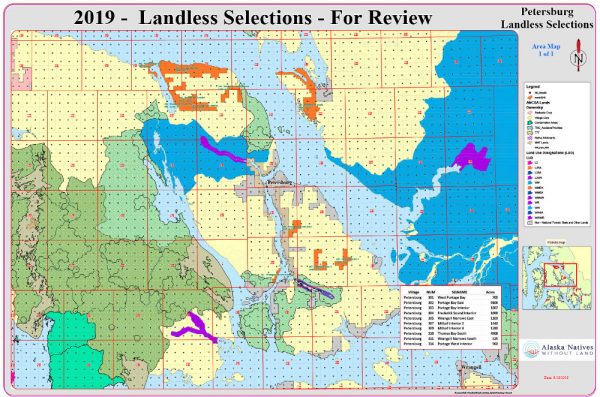
Representatives of an effort to seek land for Alaska Natives in five Southeast Alaska communities spoke briefly with Petersburg’s borough assembly this month and hope to have the support of the municipality.
The group is called Alaska Natives Without Land and represents Alaska Natives who were not granted land and village corporations under the 1971 Alaska Native Claims Settlement Act, or ANCSA. That legislation gave 44 million acres of land and $963 million to newly formed Alaska Native corporations to extinguish land claims in the rest of the state, and paved the way for the building of the trans-Alaska pipeline. Under that law, Alaska Natives in the five communities were not allowed to form corporations nor granted land.
Nicole Hallingstad, granddaughter of Petersburg civil rights leader Amy Hallingstad, told the Petersburg borough assembly this month the group is seeking support to change that.
“This is the start of a really important conversation with the communities who have stakeholders in the municipality who will be interested in what happens with that land,” Hallingstad said. “So we’re eager to have that conversation with interested parties. We’re excited about the possibility of these five communities, Petersburg, Haines, Tenakee Springs, Wrangell and Ketchikan receiving the 23,040 acres the township that they were promised under ANSCA but has never been delivered.”
Hallingstad said the group hoped to return to Petersburg to do a more formal presentation. Legislation authorizing the land selections has not yet been introduced in Congress.
As proposed, the parcels would come from the Tongass National Forest and would be transferred to new Native urban corporations. Supporters of the effort have released maps of the specific lands they’re seeking, chosen with help from Natives in each community. In the Petersburg area, those choices are at in Thomas Bay and near Point Aggasiz. Other parcels are near Portage Bay on Kupreanof Island and other spots on that island, along with several selections on central Mitkof Island.
Also representing the group was Cecilia Lopez Tavoliero, who grew up in Petersburg and still owns land here. She explained to the assembly that a new corporation would not be focused on logging its land as has happened in the past.
“It’s a different day, it’s a different age,” Lopez Tavoliero said. “When we get our corporations, we’re not going to go out there and log everything like a lot of people think that we’re going to. Our people are more educated. We’re looking to things like carbon credits. We’re looking to eco-tourism. We’re looking at other areas to do business.”
Supporters also say new Alaska Native corporations would bolster the economies in the five communities. The regional corporation Sealaska this year pledged half a million dollars to the effort.
Alaska’s Congressional delegation has tried numerous attempts at legislation to change the landmark 1971 law, but those have not passed. Opponents of those efforts have fought against turning public land over to private corporations.
Joe Viechnicki is a reporter at KFSK in Petersburg.




